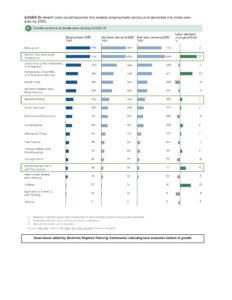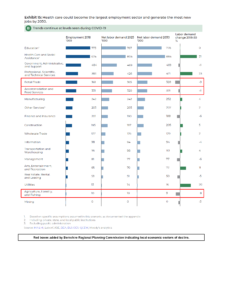New Report Charts Path for the Post-COVID Commonwealth Workplace
A July 2021 study commissioned by the Baker-Polito administration, Preparing for the Future of Work in the Commonwealth of Massachusetts, seeks to help town leaders understand how workplace shifts begun during COVID-19 could impact their communities in years to come. Conducted by McKinsey & Company, the report explores near- (2025) and long- (2030) term trends and suggests how towns can prepare for them to support residents’ and economies’ success.
The report posits three likely scenarios, each building on COVID-induced changes. In the first, employers return to a pre-COVID normal of largely office-based work. In the second, hybrid and remote work further accelerates on par with current patterns. And in the third, hybrid and remote work become permanent and ancillary trends grow (i.e., automation, e-commerce, reduction in business travel).
Across scenarios, the authors predict increasing challenges for the Commonwealth around slowing population growth, equity disparities (gender, ethnicity, education, and age), and worker re-skilling essential for Massachusetts to be competitive.
Recognizing the Commonwealth’s diverse geography and demography, the report delves into what these predicted shifts might mean for work and life at the regional level. According to the authors, Berkshire County is home to four distinct regions: Rural (23 towns); Rural Tourism-Based (Williamstown, North Adams, Adams, Cheshire, Sheffield, Great Barrington, Stockbridge, Lee); Suburban Non-Boston (Dalton, Lee); and Gateway City (Pittsfield).
In Rural and Rural Tourism-Based towns, slowing population growth will create the greatest strain on local economies, while in Suburban and Gateway Cities, housing constraints, equity, and re-skilling workers will be additional threats.
The report is particularly noteworthy in predicting the potential effects on Berkshire County’s identified critical and non-critical priority industries, among them Health Care & Social Assistance; Hospitality & Management; Advanced Manufacturing; Creative Economy; Food & Agriculture; Education; Information Technology; and Business and Finance (see Berkshire Blueprint 2019 and MassHire’s Berkshire Workforce Blueprint for more details).
The report confirms that demand for workers in Health Care & Social Assistance, Creative Economy (Arts, Entertainment, and Recreation), and Advanced Manufacturing will rise, while employment opportunities in Hospitality & Management and Food & Agriculture could shrink. For Berkshire County, which relies on tourism as a major economic driver, this raises the bar about the need to reskill workers sooner rather than later. Alternative industries such as Professional, Scientific and Technical Services will, in fact, need workers, which means preparing young people and young adults, as well as older career changers for jobs in those industries (e.g., law, accounting, bookkeeping and payroll, architecture, engineering, specialized design, computer and consulting, research, advertising, translation and interpretation, and veterinary).
Click here to watch Governor Baker’s public announcement about the report on July 13, 2021 and download the full report.
Link to charts of employment sectors predicted to increase and decline.


